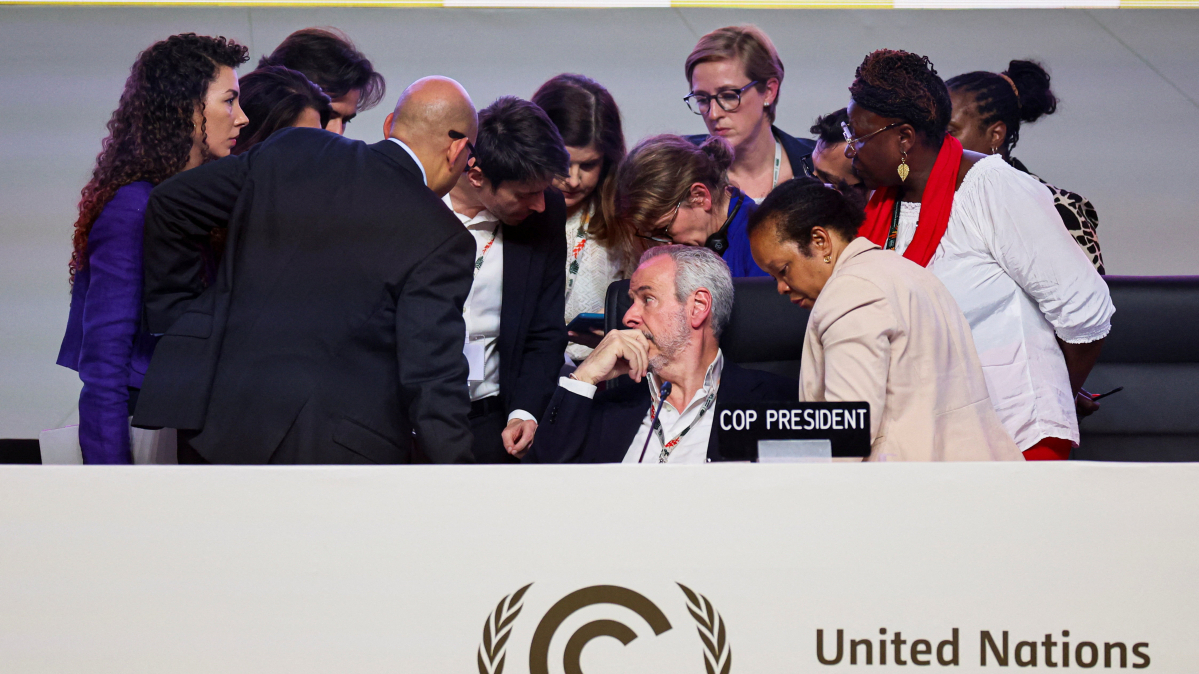'Peaceful nuclear rights are non‑negotiable,' says Iranian FM Araghchi at UN Disarmament Conference
Tehran’s right to develop and use nuclear energy for peaceful purposes is “inherent, inalienable, and non‑negotiable,” Iranian Foreign Ministe...

Brazil pushed through a compromise climate deal at COP30 in Belém, boosting funding for developing nations but sidestepping any mention of fossil fuels — the very drivers of global warming.
After two tense weeks of negotiations and an overnight standoff, Brazil’s COP30 presidency managed to steer a global climate agreement through the finish line on Saturday, aiming to showcase unity despite widening rifts between nations over how to tackle the climate crisis.
The accord, adopted in overtime in the Amazonian city of Belém, calls on wealthy nations to at least triple financial support for developing countries by 2035 to help them adapt to rising temperatures, floods, and other climate impacts. However, the deal makes no reference to fossil fuels — a key source of the emissions heating the planet.
Brazil’s COP30 President, Andre Corrêa do Lago, acknowledged the strain of the talks. “We know some of you had greater ambitions for some of the issues at hand,” he told delegates, after suspending and then resuming the final plenary session to push the deal through.
Despite the absence of the United States’ official delegation, Brazil’s presidency sought to project a sense of unity. UNFCCC Executive Secretary Simon Stiell praised the outcome as a modest but essential step forward:
“I’m not saying we’re winning the climate fight. But we are undeniably still in it — and we are fighting back.”
Fossil fuel divide
The most contentious issue remained the lack of language on phasing out fossil fuels. The European Union and several Latin American countries — including Colombia, Panama, and Uruguay — pushed for stronger commitments, arguing that the agreement failed to align with climate science.
“A consensus imposed under climate denialism is a failed agreement,” Colombia’s negotiator said, criticising the omission.
The debate escalated when Russia’s delegate accused dissenting countries of “behaving like children who want to get their hands on all the sweets” — a remark that drew sharp backlash from Latin American delegates.
In the end, Brazil’s presidency issued a separate “side text” on fossil fuels and forest protection, keeping both topics out of the main accord due to the lack of consensus.
Focus on finance
While political divisions ran deep, the deal placed renewed emphasis on climate finance. The agreement urges rich nations to triple climate adaptation funds and launches a voluntary initiative to accelerate emissions reduction efforts.
Developing nations, however, warned that the measures fell short of what’s needed. Avinash Persaud, special advisor to the President of the Inter-American Development Bank, said:
“The accord’s focus on finance is important as climate impacts mount. But I fear the world still fell short on rapid-release grants for developing countries responding to loss and damage.”
Sierra Leone’s climate minister Jiwoh Emmanuel Abdulai also voiced concern, arguing that the agreed indicators for climate resilience — including food security metrics — were “unclear, unmeasurable, and in many cases, unusable.”
A fragile victory
The deal’s approval came only after the European Union agreed not to block the final text despite its reservations. “We should support the deal because at least it is going in the right direction,” said EU Climate Commissioner Wopke Hoekstra.
The outcome underscores the persistent divide between nations calling for a phase-out of fossil fuels and those resisting any mention of them — including top oil exporters.
For Brazil, which will host the next round of climate follow-ups before handing over the COP presidency, the compromise is both a diplomatic achievement and a reminder of the uphill battle ahead.
As Corrêa do Lago concluded, the world may not yet agree on how to end the fossil fuel era — but it remains, however tenuously, still in the fight.
Iran’s Supreme National Security Council Secretary Ali Larijani said the United States could evaluate its own interests separately from those of Israel in ongoing negotiations between Tehran and Washington.
Cuba’s fuel crisis has turned into a waste crisis, with rubbish piling up on most street corners in Havana as many collection trucks lack enough petrol to operate.
Norway is holding a commanding lead in the medal standings with 12 golds and a total of 26, with Italy having an historic performance on home soil on the ninth day of the Milano-Cortina Winter Olympics on Sunday (15 February).
Iran’s Revolutionary Guards navy held military exercises in the Strait of Hormuz on Monday (16 February), state-linked media reported. The drill took place a day before renewed nuclear negotiations between Tehran and Washington in Geneva.
The Somali Army carried out a targeted airstrike in southern Somalia, killing 15 al-Shabaab militants, the country’s Defence Ministry said on Sunday.
The administration of U.S. President Donald Trump on Thursday (12 February) announced the repeal of a scientific finding that greenhouse gas emissions endanger human health, and eliminated federal tailpipe emissions standards for cars and trucks.
Tropical Cyclone Gezani has killed at least 31 people and left four others missing after tearing through eastern Madagascar, the government said on Wednesday, with the island nation’s second-largest city bearing the brunt of the destruction.
Rivers and reservoirs across Spain and Portugal were on the verge of overflowing on Wednesday as a new weather front pounded the Iberian peninsula, compounding damage from last week's Storm Kristin.
Morocco has evacuated more than 100,000 people from four provinces after heavy rainfall triggered flash floods across several northern regions, the Interior Ministry said on Wednesday.
Greenland registered its warmest January on record, sharpening concerns over how fast-rising Arctic temperatures are reshaping core parts of the island’s economy.
You can download the AnewZ application from Play Store and the App Store.

What is your opinion on this topic?
Leave the first comment